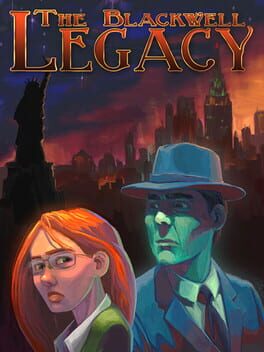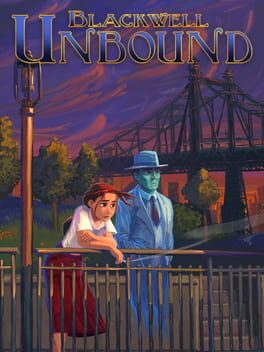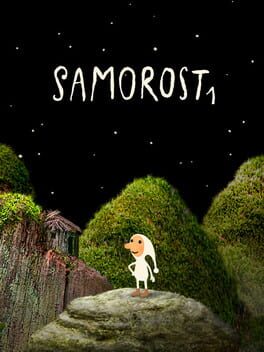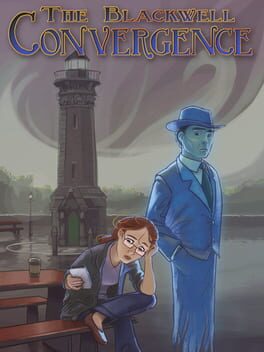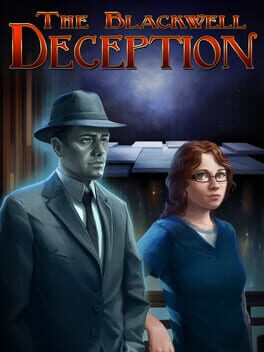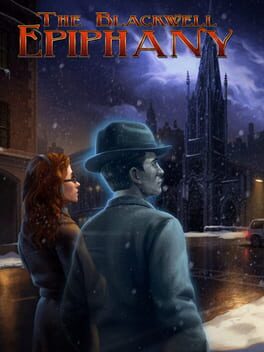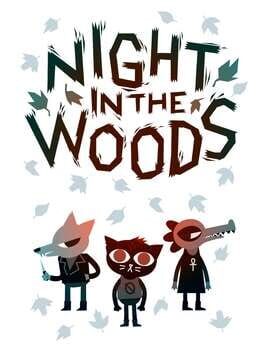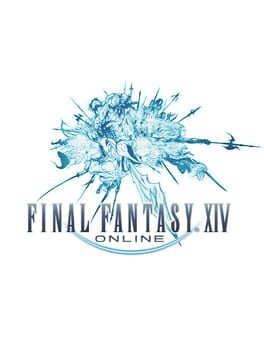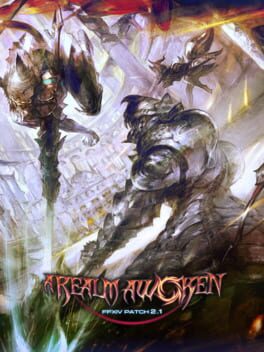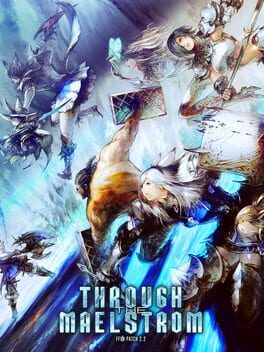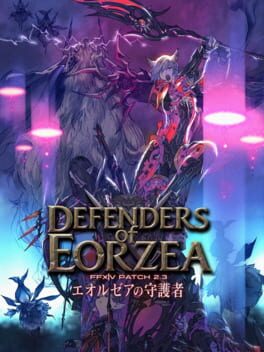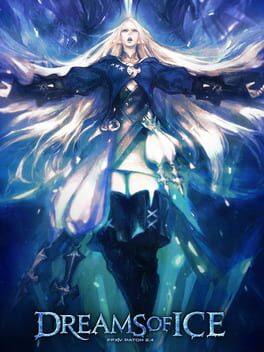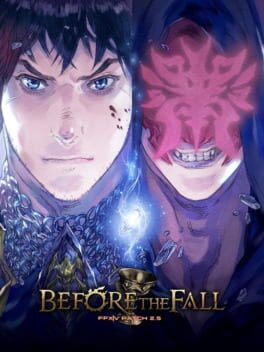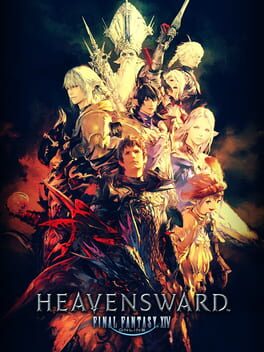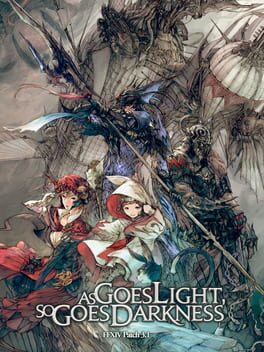guimachiavelli
2006
A lovely point-and-click adventure with an interesting story and mostly fair puzzles. Does not overstay its welcome—took me about 3 hours to get through at a leisurely pace.
The final stretch is…interesting, but feels a tad out of the blue and disconnected from the more matter-of-fact approach to the afterlife the game had been taking till then. But perhaps that's ok? My first reaction is that it feels forced, but the unannounced intervention feels thematically coherent with other point-and-click narratives.
The final stretch is…interesting, but feels a tad out of the blue and disconnected from the more matter-of-fact approach to the afterlife the game had been taking till then. But perhaps that's ok? My first reaction is that it feels forced, but the unannounced intervention feels thematically coherent with other point-and-click narratives.
2006
Not a huge change of from the previous game, Blackwell Legacy, but it's clear the creator is trying to build and improve on the previous experience, even if some interesting changes end up not adding that much to the experience.
The story, though, is definitely improved. Most characters in the narrative are very ambiguous: though initially it's easy to think about the tragedy of a dead musical genius, we eventually learn he was also sort of a jerk. His jerk-iness doesn't mean he deserved his fate, nor does it detract from this storyline's bitter melancholy. Other characters benefit from the same treatment.
The story, though, is definitely improved. Most characters in the narrative are very ambiguous: though initially it's easy to think about the tragedy of a dead musical genius, we eventually learn he was also sort of a jerk. His jerk-iness doesn't mean he deserved his fate, nor does it detract from this storyline's bitter melancholy. Other characters benefit from the same treatment.
2021
It's interesting to play this now, after having experienced a few other Amanita games. A lot of the things that make their work great is here, just very, very unpolished. It's short and sweet and would have been so much better without the human faces pasted on top of some characters.
Ok, honestly, I avoided looking at the faces as much as I could. They creeped me out in a visceral way.
Ok, honestly, I avoided looking at the faces as much as I could. They creeped me out in a visceral way.
My favourite in the series so far. The puzzles were engaging without requiring so much effort as to distract from the narrative. I was a bit saddened that this time the combination of notes—a main mechanic of past titles—was abandoned. On one hand, sure, it was very easy to brute force combine everything to see if anything stuck together, but on the other…it was a nice. The "hint" system (asking Joey what to do next) worked very well too, giving just enough information instead of spoiling things.
The story itself was interesting, tying up very nicely with the prequel even as it indicates a way forward that is neither a repetition of what has happened so far, nor provided of actual new information. I am particularly interested in how, at the bottom of it, the series keeps coming back to the idea of communication and the effects of its breakdown.
The story itself was interesting, tying up very nicely with the prequel even as it indicates a way forward that is neither a repetition of what has happened so far, nor provided of actual new information. I am particularly interested in how, at the bottom of it, the series keeps coming back to the idea of communication and the effects of its breakdown.
This review contains spoilers
Gameplay changed little from previous entries, with mostly cosmetic changes (e.g. Rosa now uses her cellphone instead of a computer). Combining notes is once again a thing, used just in the right away: it's neither the only thing you need to do, nor completely forgotten. Puzzles were nice too, though, as another reviewer mentioned, one of them was a bit too obscure.
The story remains the strong point, especially in how each game stands well as single entry but still gives us glimpses into the overarching story connecting the Countess and Madeline to Joey and the Blackwells.
There's a particular development I find very interesting. Blackwell Legacy ends in a weird expansion of the fantasy elements of this storyworld, adding sin and demons into what was till then a world in which death is morally neutral. It was a jarring ending because of how nothing in the story had hinted at that sort of thing. In this game, we are slowly primed to the fact Gavin is doing something very creepy, so the revelation that he's some kind of lifeforce leech who lived for more than 200 years is much more successful.
The story remains the strong point, especially in how each game stands well as single entry but still gives us glimpses into the overarching story connecting the Countess and Madeline to Joey and the Blackwells.
There's a particular development I find very interesting. Blackwell Legacy ends in a weird expansion of the fantasy elements of this storyworld, adding sin and demons into what was till then a world in which death is morally neutral. It was a jarring ending because of how nothing in the story had hinted at that sort of thing. In this game, we are slowly primed to the fact Gavin is doing something very creepy, so the revelation that he's some kind of lifeforce leech who lived for more than 200 years is much more successful.
This review contains spoilers
A bittersweet ending to a very enjoyable series. Though part of me would have preferred it to continue, I think it was a very wise decision to conclude it now: gameplay-wise, the framework laid out on Legacy has sort of reached its limit. As much as we get some interesting variations (double-ghost!), another game or games would have probably been too much.
As usual, what shines here is the story. Many threads are finally sewn together and some are partially retconned with great success, leading to a string of final scenes that for the most part feel natural instead of a forced ending. Some aspects (e.g. turning a ghost into a living human again) feel forced, whilst others are not fully integrated into the main story (the energy "vampires"). I also question a bit Rosa's forcing every spirit through the gate thing being presented as a good thing, as I assumed that it was an annoying but good thing that ghosts had to reach awareness themselves and no one could force them through the door.
A few reviews ago I mentioned how the series seems to revolve around the concept of communication. This final episode negates that hypothesis: instead of an unwillingness to communicate, what really brings the Blackwells down is an evil external force. It's a somewhat disappointing resolution in that sense, though I completely understand there were ethically questionable aspects of misrepresenting mental illnesses and of creating a very unhealthy dynamic in which Rosangela saves ghosts not out of a desire to do nice things, but because there's a gun pointed at her head (work or die, essentially).
As usual, what shines here is the story. Many threads are finally sewn together and some are partially retconned with great success, leading to a string of final scenes that for the most part feel natural instead of a forced ending. Some aspects (e.g. turning a ghost into a living human again) feel forced, whilst others are not fully integrated into the main story (the energy "vampires"). I also question a bit Rosa's forcing every spirit through the gate thing being presented as a good thing, as I assumed that it was an annoying but good thing that ghosts had to reach awareness themselves and no one could force them through the door.
A few reviews ago I mentioned how the series seems to revolve around the concept of communication. This final episode negates that hypothesis: instead of an unwillingness to communicate, what really brings the Blackwells down is an evil external force. It's a somewhat disappointing resolution in that sense, though I completely understand there were ethically questionable aspects of misrepresenting mental illnesses and of creating a very unhealthy dynamic in which Rosangela saves ghosts not out of a desire to do nice things, but because there's a gun pointed at her head (work or die, essentially).
2017
Gameplay is quite honestly atrocious: there's a bit of platforming, a bit of walking around, a bit of rhythm game, but all of it is painfully mediocre. It's like the developers actually wanted to make an interactive fiction piece, changed their minds at the last minute, and tacked random bits of badly executed game-like gimmicks on top of what they had.
Narrative, though, is really quite good. A slow start acquaints the player with the cast and cements how everyone's sort of messed up but really trying their best, only for things to become really intense towards the final third of the game. There's some nice mix of conservative ghouls, cosmic horror, and the damage our neoliberal capitalist world wreaks in our communities and minds. Also, be gay, do crimes.
Narrative, though, is really quite good. A slow start acquaints the player with the cast and cements how everyone's sort of messed up but really trying their best, only for things to become really intense towards the final third of the game. There's some nice mix of conservative ghouls, cosmic horror, and the damage our neoliberal capitalist world wreaks in our communities and minds. Also, be gay, do crimes.
For the most part, A Realm Reborn is an average Final Fantasy game, for better and worse: the hero chosen by the crystal saves the realm by killing ten purple rats, fetching cheese, fighting the evil empire, and repeatedly murdering gods. There are interesting aspects in the narrative, but most of them go mostly unexplored so far: the blatant racism against the "beast tribes" for one. I am continuously enthralled by the vague borders denying personhood to beastmen, and how that is used as an excuse to nonchalantly renege on treaties, with a mere slap on a ruler's wrist.
Gameplay is weirdly addictive. It's not particularly great, but it is fun in its own, MMO kind of way. Skills, rotations, cooldowns, tanks, healers, and DPSs.
As of 2022, all mandatory online elements for the initial leg of the game can be done alone with a party of NPCs, which is something I'm still on the fence about. As an introvert, I enjoy taking things at my own pace; on the other hand, it feels like a crutch because NPCs are not available to side content that could still interest a casual player.
Gameplay is weirdly addictive. It's not particularly great, but it is fun in its own, MMO kind of way. Skills, rotations, cooldowns, tanks, healers, and DPSs.
As of 2022, all mandatory online elements for the initial leg of the game can be done alone with a party of NPCs, which is something I'm still on the fence about. As an introvert, I enjoy taking things at my own pace; on the other hand, it feels like a crutch because NPCs are not available to side content that could still interest a casual player.
Though the story itself is not particularly interesting—possibly because it's focussed around a very boring character—it is nice as a break from the overly serious ending of A Realm Reborn.
It is also something new for me. I cannot easily find the words, but, once a JRPG's main plot is over, its world becomes static. You may be able to finish loose ends here and there, but no significant change is possible. This being an MMO—a game-as-service shudders—the world continues very much alive and moving forward. It doesn't clearly signal where it's going, but that's fine: this 2.1 feels a bit like those moments after a big life event when one is sort of dizzy and lost, just trying to get their bearings.
It is also something new for me. I cannot easily find the words, but, once a JRPG's main plot is over, its world becomes static. You may be able to finish loose ends here and there, but no significant change is possible. This being an MMO—a game-as-service shudders—the world continues very much alive and moving forward. It doesn't clearly signal where it's going, but that's fine: this 2.1 feels a bit like those moments after a big life event when one is sort of dizzy and lost, just trying to get their bearings.
As with the previous patch, it's interesting to see the story slowly developing and balancing different branches that will probably converge to trigger the events that lead to Heavensward. I do not care particularly about the threads regarding Ascians, but I like the fact the treatment of beastmen is highlighted as a major, if not the sole, reason behind Eorzea facing catastrophe again and again. Limsa Lominsa clearly sees Sahagin and Kobolds as nuisances instead of creatures with as much right to live as them, then complains when these same creatures try to murder their oppressor. I'm, like, 70% team beastmen at this point.
From a complete casual viewpoint, Full Party content is absolute chaos. I can hardly imagine how messed up Alliance Raids are.
From a complete casual viewpoint, Full Party content is absolute chaos. I can hardly imagine how messed up Alliance Raids are.
The story continues advancing, setting myriad threads that cross each other, hinting at possible connections and developments, but never really coming together. This weaving is interesting, in some respects: the element that seems to unite all those disparate threads right now is the overconfidence, the overestimation of everyone's capabilities. The Warrior of Light will never lose, the Scions are all 100% trustworthy and infallible—so much so that everyone's totally OK with a rich 16-year-old assembling his own paramilitary group partly funded by dirty money.
As far as gameplay goes, it's hard to really evaluate any FFXIV patch years after its initial release: though a player follows each patch's story linearly at their own pace, mechanics always follow the latest update (currently 6.28, I believe).
As far as gameplay goes, it's hard to really evaluate any FFXIV patch years after its initial release: though a player follows each patch's story linearly at their own pace, mechanics always follow the latest update (currently 6.28, I believe).
The Scions and their Crystal Braves continue making terrible decisions. The narrative's repeated references to the Warrior of Light's undisputed fame, prowess, and just overall goodness has become pretty obviously foreshadowing: none of this will last. Another bit of of foreshadowing is how discovering a traitor amongst the Immortal Flames is also a hint at treachery closer to the WoL.
All this foreshadowing gets exhausting, however. It's clear the writers are basically seeding years worth of plot in each one of these patches, which on one hand is great, but on the other is a bit exhausting. We are constantly denied closure, living in a doubtless entertaining and intriguing limbo, but a limbo nevertheless.
All this foreshadowing gets exhausting, however. It's clear the writers are basically seeding years worth of plot in each one of these patches, which on one hand is great, but on the other is a bit exhausting. We are constantly denied closure, living in a doubtless entertaining and intriguing limbo, but a limbo nevertheless.
As expected after a barrage of foreshadowing via exaggerated overestimation of the capabilities of the Warrior of Light and associated factions, the once-celebrated heroes are now fugitives. It's an unsurprising twist with both good and bad sides.
On one hand, FFXIV's plot would probably not last very long. If the hero keeps winning, there's no true conflict and no true development. In this particular case, having a 16-year-old commanding a paramilitary organisation with some success was already straining very hard at the seams of verisimilitude.
On the other, it was very nice to imagine for a brief moment what happens after the hero saves the world. As in, to believe that a fall was not inevitable and to play through the slow day-to-day life after the credits roll.
It also makes me wonder: this story is still going on after roughly a decade. How many other falls and how many resurgences will follow?
On one hand, FFXIV's plot would probably not last very long. If the hero keeps winning, there's no true conflict and no true development. In this particular case, having a 16-year-old commanding a paramilitary organisation with some success was already straining very hard at the seams of verisimilitude.
On the other, it was very nice to imagine for a brief moment what happens after the hero saves the world. As in, to believe that a fall was not inevitable and to play through the slow day-to-day life after the credits roll.
It also makes me wonder: this story is still going on after roughly a decade. How many other falls and how many resurgences will follow?
A marked improvement from the original re-release in most senses.
Gameplay-wise, dungeons don't feel particularly good yet, but the designers did avoid the worst decisions from 2.0, like the cutscene bonanza from the Praetorium. I am not a fan of any of the three new classes (Astrologian, Dark Knight, Machinist), but that's ultimately down to personal preference.
The narrative itself is probably the best element here. There is good momentum, story beats feel more or less reasonable, and most elements are focussed. As is often the case with Final Fantasy games, it's hard not to feel some level of attachment to the cast—I was pretty bummed when one and then another important characters met an untimely (though heroic) death.
When saying the narrative is very good, it's probably required to make a caveat of sorts. This is not good in the same way, say, the realist novel is. Spades of suspension of disbelief are required at every turn, as well as just going along with the melodrama: your main companion for the whole expansion is a 16-year-old boy who's very smart for his age and accidentally created a rogue paramilitary organisation almost immediately after its creation; you're continuously killing gods to a point people barely pretend to be concerned; your character is basically a cluster of chosen ones, being the once-in-a-generation Azure Dragoon, reclaiming the ages-old military secrets of Allagan civilisation, the Warrior of Light—the list goes on and is surely to continue growing as the game moves forward. My point is, it's all very exaggerated and impossible, but in a good way.
In some ways it's impressive to play this game now, with the benefit of hindsight, and seeing all the ways the world manages to keep its consistency and how the plot not only alternates between threads, but keeps seeding new bits that will grow to fruition in other expansions. For example, like how it's revealed that gods/primals/eikons are more a reflection of a summoner's beliefs than a true deity with an existence independent from others—an increasingly common but still interesting trope.
My biggest complaint is about the ending, which is almost not an ending at all. I know this will get sorted in the patches, but it makes Heavensward feel less complete as a story due to that last "unexpected" comeback.
Gameplay-wise, dungeons don't feel particularly good yet, but the designers did avoid the worst decisions from 2.0, like the cutscene bonanza from the Praetorium. I am not a fan of any of the three new classes (Astrologian, Dark Knight, Machinist), but that's ultimately down to personal preference.
The narrative itself is probably the best element here. There is good momentum, story beats feel more or less reasonable, and most elements are focussed. As is often the case with Final Fantasy games, it's hard not to feel some level of attachment to the cast—I was pretty bummed when one and then another important characters met an untimely (though heroic) death.
When saying the narrative is very good, it's probably required to make a caveat of sorts. This is not good in the same way, say, the realist novel is. Spades of suspension of disbelief are required at every turn, as well as just going along with the melodrama: your main companion for the whole expansion is a 16-year-old boy who's very smart for his age and accidentally created a rogue paramilitary organisation almost immediately after its creation; you're continuously killing gods to a point people barely pretend to be concerned; your character is basically a cluster of chosen ones, being the once-in-a-generation Azure Dragoon, reclaiming the ages-old military secrets of Allagan civilisation, the Warrior of Light—the list goes on and is surely to continue growing as the game moves forward. My point is, it's all very exaggerated and impossible, but in a good way.
In some ways it's impressive to play this game now, with the benefit of hindsight, and seeing all the ways the world manages to keep its consistency and how the plot not only alternates between threads, but keeps seeding new bits that will grow to fruition in other expansions. For example, like how it's revealed that gods/primals/eikons are more a reflection of a summoner's beliefs than a true deity with an existence independent from others—an increasingly common but still interesting trope.
My biggest complaint is about the ending, which is almost not an ending at all. I know this will get sorted in the patches, but it makes Heavensward feel less complete as a story due to that last "unexpected" comeback.
Patch 3.1 felt a little unfocussed, with the Warrior of Light being pulled from one seemingly important but inconclusive quest to the other.
The introduction of the Warriors of Darkness, for example, is interesting, but relies a bit too much on ominous implications to be truly gripping.
The return of another Scion feels weirdly anticlimactic, somehow.
The introduction of the Warriors of Darkness, for example, is interesting, but relies a bit too much on ominous implications to be truly gripping.
The return of another Scion feels weirdly anticlimactic, somehow.
